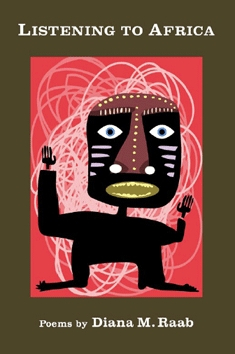Listening to Africa
Sometimes the story behind a book is more interesting than the collection itself. In Listening to Africa, Raab travels to Africa in the wake of a devastating second cancer diagnosis. Her husband and three grown children come with her. This back story creates much of the volume’s tension. Every foreign microbe has the potential to upset the delicate balance of her health; every foreign experience similarly can upset family harmony, particularly an urban family accustomed to the ease of city living. Raab presents an emotionally open, and linguistically accessible volume chronicling that journey; but while the author addresses the aforementioned tensions in various poems, the language and description rarely rise to that same level of interest.
Raab’s publishing history is diverse and fascinating. She authored three other books of poetry, two books on pregnancy (The High-Risk Pregnancy and Getting Pregnant and Staying Pregnant) and an award-winning memoir, Regina’s Closet, as well as editing three anthologies, Writers on the Edge, Writers and their Notebooks and Healing with Words. Her varied background helps to create the reader’s sense of the writer as she moves through Namibia, Botswana, and Zimbabwe.
Broken into four parts, the book follows the journey chronologically, using “Early Thoughts” to introduce her misgivings and hopes for the travel ahead. In “Amplified Melancholy,” one of the more moving poems of the volume, Raab writes of her melancholy, linking it to the tenth anniversary of her father’s death, when “the doctors removed // my right breast and five years later / stabbed by a second diagnosis, / bone marrow malignancy.” Africa gives her a new dream: “to leave behind what haunts me: / the healthy bones dad once bestowed.”
Raab is very frank about her physical fears, from riding in tiny planes to eating foreign food and microbes; still, the journey changes her in expected ways. She grows closer to her family, values her life and her privilege more than ever, pities and envies the locals for their simple lifestyles. This is not to undermine the power of those changes and experiences, but the poems act more as travelogue than they might have in more transformative language and metaphor. The figurative leap that often occurs in poetry rarely occurs here, which makes the poems easy to read and absorb, but also may not encourage a second reading.
Raab writes a thoughtful narrative about her time in Africa, which armchair travelers ought to enjoy. Her illness and its precariousness in a precarious land makes for a compelling background, and many readers will enjoy the strict adherence to chronology and description.
Reviewed by
Camille-Yvette Welsch
Disclosure: This article is not an endorsement, but a review. The publisher of this book provided free copies of the book and paid a small fee to have their book reviewed by a professional reviewer. Foreword Reviews and Clarion Reviews make no guarantee that the publisher will receive a positive review. Foreword Magazine, Inc. is disclosing this in accordance with the Federal Trade Commission’s 16 CFR, Part 255.

